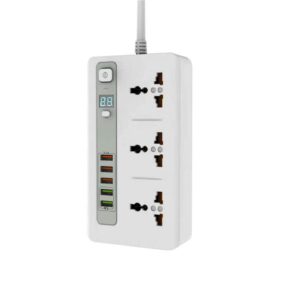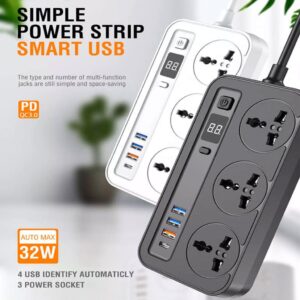-
-
Fast Charging mobile Charger, Mobile Charger, PD Charger, Power Socket
Aspor A505PD Quick Charge Power Socket
৳ 1,9000 out of 5
The demand for dependable power outlets has increased more than ever as technology develops. Every electrical system must have outlets because they supply electricity for devices like phones, laptops, kitchen appliances, and lighting fixtures.
You’ve come to the right spot if you’re looking for a new socket. This thorough guide will explain the various socket types, how to pick the best one for your requirements, and where to locate the best ones available.
What are Electrical Sockets?
Electrical sockets, also referred to as outlets, are objects that give electrical gadgets a point of connection to a power source. To power everything from lamps and TVs to refrigerators and air conditioners, they are usually installed into walls or other structures.
Types of Electrical Sockets
There are several types of electrical sockets available, each designed for specific purposes. Some of the most common types of sockets include:
- Duplex outlets: These are the most common type of socket and are found in most homes and offices. They have two outlets that can be used simultaneously.
- GFCI outlets: These are designed to protect against electric shocks and are commonly used in areas where water is present, such as bathrooms and kitchens.
- USB outlets: These sockets have USB ports built into them, allowing you to charge your phone or other USB devices directly from the wall.
- Smart outlets: These are Wi-Fi-enabled sockets that can be controlled using a smartphone app. They allow you to turn off or on the power remotely.
How to Choose the Right Socket for Your Needs
When choosing a socket, there are several factors to consider. Some of the most important considerations include:
- Wattage: Make sure the socket you choose can handle the wattage of the device you want to plug in.
- Location: Consider where you will be using the socket and choose one that is appropriate for that location.
- Safety features: If you have children or pets, consider choosing a socket with built-in safety features.
Benefits of High-Quality Electrical Sockets
Investing in high-quality electrical sockets has several benefits, including:
- Improved safety: High-quality sockets are less likely to cause fires or electrical shocks.
- Better performance: High-quality sockets provide a more reliable and consistent power supply.
- Longer lifespan: High-quality sockets are built to last, which means you won’t need to replace them as often.
Where to Find High-Quality Electrical Sockets
There are several places to find high-quality electrical sockets, including:
- Online retailers: Websites like Fixit.com.bd offer a wide range of sockets at competitive prices.
- Home improvement stores: Many home improvement stores carry a selection of sockets.
- Electrical supply stores: Stores that specialize in electrical supplies are another good place to look for sockets.
How to Install Electrical Sockets
Although it is possible to place electrical sockets on your own, hiring a qualified electrician is advised. They will make sure the outlets are set up securely and in accordance with local electrical regulations.
Maintenance and Troubleshooting
It’s crucial to perform routine maintenance on your electrical sockets to maintain them in good working condition. This entails inspecting the sockets for loose connections, cleaning them, and changing any that are damaged.
Turn off the power right away and call a certified electrician for assistance if you notice sparks or a burning scent coming from your sockets.
Cost of Electrical Sockets
Depending on the type and quality of the socket, the price of electrical outlets can differ significantly. Prices for duplex outlets start at about $1 to $2 per outlet, making them usually the most affordable. The price of GFCI outlets and USB outlets is a little higher, beginning at $10–20 per outlet. The most costly outlets are smart outlets, which start at about $20–30 per outlet.
Conclusion
Any electrical system would be incomplete without electrical sockets, which supply electricity to both tiny and large appliances. It’s critical to select the best socket for your unique requirements from the wide range of options on the market. You can discover a high-quality socket that will deliver dependable and secure power for many years by taking factors like wattage, location, and safety features into consideration.
FAQs
Q: Can I install electrical sockets myself?
A: While it is possible to install electrical sockets yourself, it is recommended that you hire a licensed electrician to ensure that the sockets are installed safely and in compliance with local electrical codes.
Q: How long do electrical sockets last?
A: Electrical sockets can last for many years, but it’s important to perform regular maintenance and replace any damaged sockets as needed.
Q: Are smart outlets more expensive than regular outlets?
A: Yes, smart outlets are more expensive than regular outlets due to their Wi-Fi-enabled features.
Q: What should I do if I smell burning from an electrical socket?
A: Turn off the power immediately and contact a licensed electrician for help.
Q: Can I plug a USB device into a regular electrical socket?
A: No, you will need a special USB outlet that has a USB port built into it.
Q: How do I know if I need a higher-wattage socket?
A: Check the wattage of the device you want to plug in and choose a socket that can handle that amount of wattage.
Q: What safety features should I look for in an electrical socket?
A: Look for sockets with built-in safety features like tamper-resistant outlets, ground fault circuit interrupters (GFCIs), and arc fault circuit interrupters (AFCIs).
Q: Can I replace a regular outlet with a GFCI outlet?
A: Yes, you can replace a regular outlet with a GFCI outlet for increased safety in areas where water is present.
Q: What is the difference between a duplex outlet and a GFCI outlet?
A: A duplex outlet has two sockets for plugging in devices, while a GFCI outlet is designed to protect against electric shocks and is commonly used in areas where water is present, such as bathrooms and kitchens.
Q: Can I use a surge protector with a GFCI outlet?
A: Yes, you can use a surge protector with a GFCI outlet, but it’s important to make sure the surge protector is rated for use with GFCI outlets.




